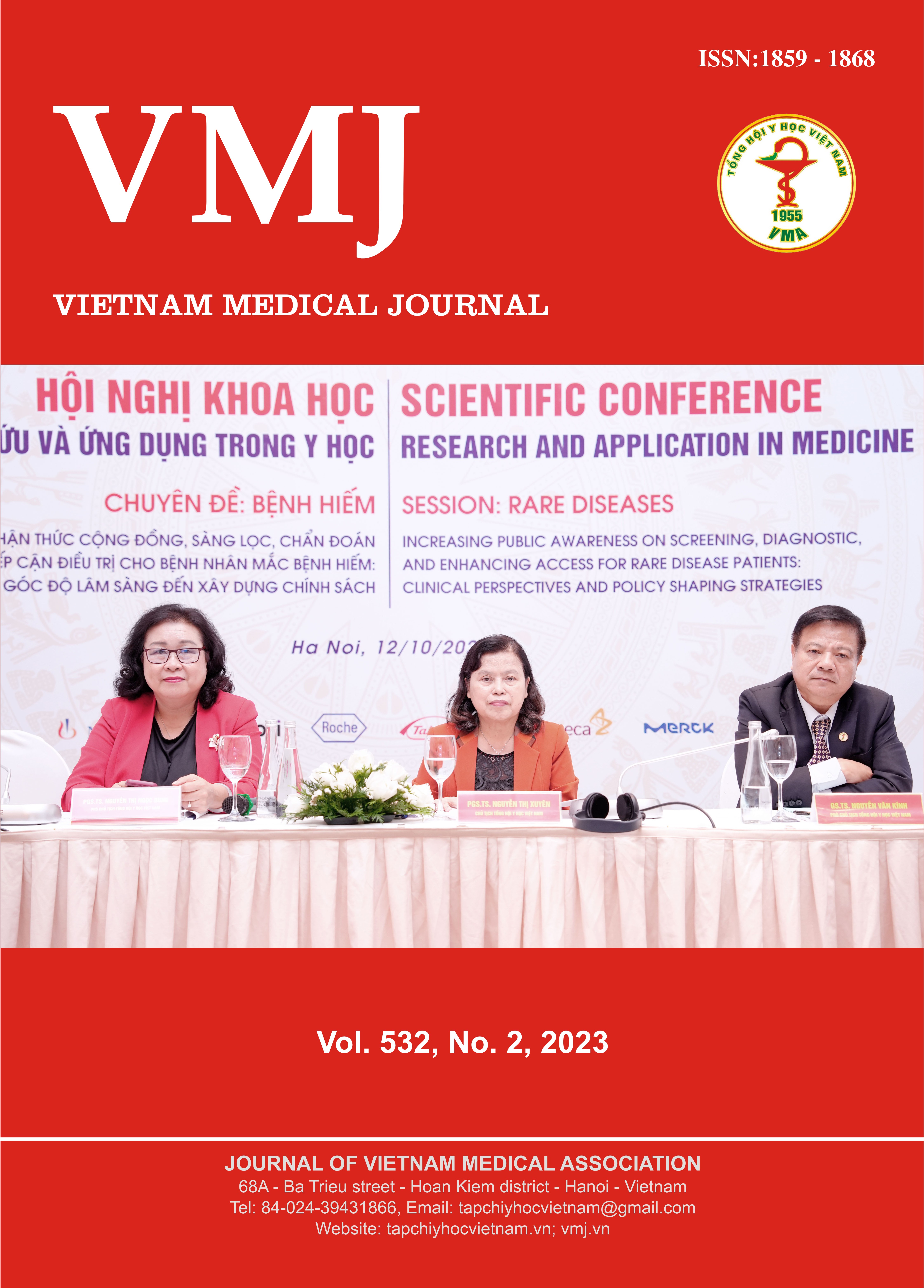INVESTIGATION OF EXON20 PIK3CA GENE MUTATION IN PLASMA OF HORMONE RECEPTOR POSITIVE BREAST CANCER PATIENTS
Nội dung chính của bài viết
Tóm tắt
Objective: To determine the frequency of H1047R mutation on exon 20 PIK3CA gene in the plasma of hormone recepter positive (HR+) breast cancer (BC) women and its relationship with clinical characteristics of these patients. Subjects: Plasma was separated from venous blood of 141 female HR+ BC patients, have been treating at 108 Military Central Hospital from June 2021 to June 2023. Method: Circulating free DNA (cfDNA) was isolated from plasma by magnetic beads (Thermo Fisher Scientific). The H1047R hotspot mutation on exon 20 PIK3CA gene was detected in 141 plasma samples by an in-house Realtime PCR assay using a wild-type allele-specific blocker. Results: 47/141 samples (33,3 %) had the H1047R mutation. The H1047R mutation was present in all disease stages, both in metastatic and non-metastatic cases. Although, the rates of gene mutation in late-stage, metastatic cancer patients were higher than those in the early-stage, non-metastatic cancer group, there was no statistically significant difference between the two groups (p > 0.05). Whereas it was not linked to other clinical traits of patients with HR+BC, the H1047R mutation was more common in those with liver metastases and in those received Fulvestrant (p < 0.05). Conclusion: Peripheral blood from patients with HR+BC in all stages contained the H1047R mutation on exon 20 of the PIK3CA gene. This mutation frequently developed in patients received Fulvestrant treatment and has been related to liver metastases.
Chi tiết bài viết
Từ khóa
breast cancer, PIK3CA gene, plasma, mutation, circulating free DNA
Tài liệu tham khảo
2. Pan, H., et al., 20-Year Risks of Breast-Cancer Recurrence after Stopping Endocrine Therapy at 5 Years. N Engl J Med, 2017. 377(19): p. 1836-1846.
3. Lau, K.H., Tan, A. M., Shi, Y., New and Emerging Targeted Therapies for Advanced Breast Cancer. Int J Mol Sci, 2022. 23(4).
4. Anderson, E.J., Mollon, L. E., Dean, J. L., Warholak, T. L., Aizer, A., Platt., E. A., Tang, D. H., Davis, L. E., A Systematic Review of the Prevalence and Diagnostic Workup of PIK3CA Mutations in HR+/HER2- Metastatic Breast Cancer. Int J Breast Cancer, 2020. 2020: p. 3759179.
5. André, F., et al., Alpelisib plus fulvestrant for PIK3CA-mutated, hormone receptor-positive, human epidermal growth factor receptor-2-negative advanced breast cancer: final overall survival results from SOLAR-1. Ann Oncol., 2021. 32(2)(1569-8041 (Electronic)): p. 208-217.
6. Flavia R. Mangone, I.G.B., Sibeli Salaorni, Erika Manuli, Maria A. Nagai, PIK3CA exon 20 mutations are associated with poor prognosis in breast cancer patients. CLINICAL SCIENCE, 2012. 67(11): p. 1285-1290.
7. Takashi Takeshita, Y.Y., Mutsuko Yamamoto-Ibusuki, Mai Tomiguchi, Aiko Sueta, Keiichi Murakami, Yoko Omoto and Hirotaka Iwase, Analysis of ESR1 and PIK3CA mutations in plasma cell-free DNA from ER-positive breast cancer patients. Oncotarget., 2017. 8(32): p. 52142-52155.
8. Takashi Takeshita, Y.Y., Mutsuko Yamamoto-Ibusuki, Toko Inao, Aiko Sueta, Saori Fujiwara, Yoko Omoto and Hirotaka Iwase, Prognostic role of PIK3CA mutations of cell-free DNA in early-stage triple negative breast cancer. Cancer Sci 2015. 106: p. 1582–1589.
9. Alfonso Alba-Bernal, R.L.-V., María Emilia Domínguez-Recio, Challenges and achievements of liquid biopsy technologies employed in early breast cancer. EBioMedicine, 2020. 62: p. 103100.
10. Giaquinto, A.N., Sung, H, Miller, K. D, Kramer, J. L, Newman, L. A, Minihan, A, Jemal, A, Siegel, R. L., Breast Cancer Statistics, 2022. CA Cancer J Clin, 2022. 72(6): p. 524-541.
11. Mosele, F., et al., Outcome and molecular landscape of patients with PIK3CA-mutated metastatic breast cancer. Ann Oncol, 2020. 31(3): p. 377-386.
12. Martínez-Sáez, O., Chic, N., Pascual, T., Adamo, B., Vidal, M., González-Farré, B., Sanfeliu, E., Schettini, F., Conte, B., Brasó-Maristany, F., Rodríguez, A., Martínez, D., Galván, P., Rodríguez, A. P., Martinez, A., Muñoz, M., Prat, A., Frequency and spectrum of PIK3CA somatic mutations in breast cancer. Breast Cancer Research, 2020. 22.
13. Addanki, S., et al., Applications of Circulating Tumor Cells and Circulating Tumor DNA in Precision Oncology for Breast Cancers. Int J Mol Sci, 2022. 23(14).
14. Takashi Takeshitaa, Y.Y., Mutsuko Yamamoto-Ibusukib, Mai Tomiguchia, Aiko Suetaa and Hirotaka Iwase, ESR1 and PIK3CA mutational status in serum and plasma from metastatic breast cancer patients: A comparative study. Cancer Biomarkers, 2018. 8: p. 48.
15. William Jacot, F.D., Evelyne Lopez‑Crapez, Leonor Chaltiel , Anna Durigova, Nathalie Gros, Nicolas Lozano, Jean‑Louis Lacaze, Stéphane Pouderoux, Laurence Gladieff, Gilles Romieu, Henri Roché, Thomas Filleron, Pierre‑Jean Lamy, PIK3CA mutations early persistence in cell‑free tumor DNA as a negative prognostic factor in metastatic breast cancer patients treated with hormonal therapy. Breast Cancer Research and Treatment, 2019. 2019.


